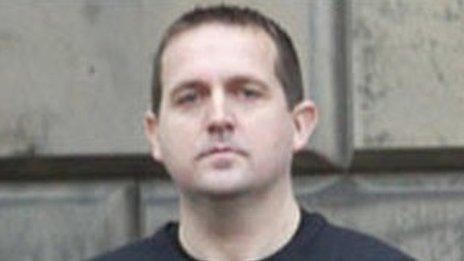Gangland hit man William Gage loses jail smoking challenge
- Published

William Gage was jailed for a minimum of 20 years for the murder of Justin McAlroy
A gangland hit man who is serving a life term for murder has lost a legal challenge over fears he may develop cancer from passive smoking in prison.
William Gage is serving a minimum of 20 years for shooting Justin McAlroy in Cambuslang, South Lanarkshire, in 2002.
Gage, 43, whose parents died of cancer after smoking, said he was vulnerable to tobacco smoke at Shotts jail and the Scottish government should move him.
A judge has now ruled there is nothing illegal about his prison conditions.
Smoking in public places such as pubs and shopping centres has been banned since 2005 but prison cells were deemed as private residences, making them exempt.
A hearing at the Court of Session in Edinburgh was previously told that Gage had made repeated complaints within Shotts jail, where he has been held since 2004, about being left vulnerable to environmental tobacco smoke (ETS) inside the prison.

Gage is being held at Shotts Prison
Gage's parents died from smoking-related cancer he was said to be worried he may develop cancer through passive smoking.
His counsel, Christopher Pirie, told a judge that Gage wanted to be held in one of Scotland's prisons which had smoke-free areas.
The Scottish government contested the action and the court was told that Gage was housed in a relatively modern prison with ventilation systems.
Support was also offered to prisoners who wanted to stop smoking.
In his ruling, judge Lord Armstrong said: "I am not persuaded that the exercise of the respondents' powers to detain the petitioner, in the circumstances in which he currently finds himself, unfortunate and undesirable though that situation may be, is unreasonable and therefore unlawful or that it was or is being implemented on a basis which can be said to be otherwise irrational.
"The facts of this case indicate that while it is clear that the respondents are alive to the petitioner's concerns, nevertheless the appropriate means of addressing them necessarily require consideration of the likely consequential greater impact on the entire prison service, and in particular the likely effect on the whole prison population and the management of the prison estate."
Following his conviction, Gage spent years maintaining he was a victim of a miscarriage of justice.
His case was later referred to the Court of Criminal Appeal by the Scottish Criminal Cases Review Commission, which looks into alleged miscarriages of justice.
It was rejected, however, by a panel of five judges in 2012.
- Published23 October 2015

- Published27 January 2012

- Published13 December 2011
